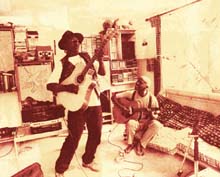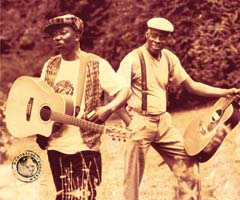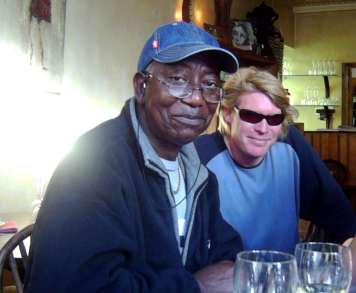 Papa Noel - real name
Antoine Nedule Monswet - was born on Christmas Day, 1940 in Leopoldville, as
the old colonial capital of the Belgian Congo was then called. Yet the first
music he heard as a boy was not African but Cuban son, via his motherıs
phonograph and the imported 78s they played all day on Radio Congo Belge.
When she bought him a guitar at an early age, Papa Noel taught himself to
play both his motherıs Cuban favourites and the Congolese rumba then being
made popular by the first wave of emerging local stars. The Congolese
version of rumba took the imported Cuban rhythms but added distinctively
African idioms, elements of tribal folklore and the melodic cadences of the
Lingala language to turn it into something uniquely different. But most
important of all, the piano, so dominant in Afro-Cuban forms, was replaced
by the guitar. Indeed, the guitar soon became THE sound of Congolese rumba,
particularly after the introduction of the electric instrument in the 1940s
when the traditional strumming method was replaced by an intricate
finger-picking style. Soon the most famous musicians in Kinshasa were
guitarists. Antoine Wendo, Dewayon and Henri Bowane were all in the first
wave. They, in turn, influenced the likes of Franco, Dr Nico and, of course
Papa Noel, who between them took the sound to new heights. Papa Noel - real name
Antoine Nedule Monswet - was born on Christmas Day, 1940 in Leopoldville, as
the old colonial capital of the Belgian Congo was then called. Yet the first
music he heard as a boy was not African but Cuban son, via his motherıs
phonograph and the imported 78s they played all day on Radio Congo Belge.
When she bought him a guitar at an early age, Papa Noel taught himself to
play both his motherıs Cuban favourites and the Congolese rumba then being
made popular by the first wave of emerging local stars. The Congolese
version of rumba took the imported Cuban rhythms but added distinctively
African idioms, elements of tribal folklore and the melodic cadences of the
Lingala language to turn it into something uniquely different. But most
important of all, the piano, so dominant in Afro-Cuban forms, was replaced
by the guitar. Indeed, the guitar soon became THE sound of Congolese rumba,
particularly after the introduction of the electric instrument in the 1940s
when the traditional strumming method was replaced by an intricate
finger-picking style. Soon the most famous musicians in Kinshasa were
guitarists. Antoine Wendo, Dewayon and Henri Bowane were all in the first
wave. They, in turn, influenced the likes of Franco, Dr Nico and, of course
Papa Noel, who between them took the sound to new heights.
Papa Noel made his first recordings in
1957 and subsequently went on to play in a number of bands - Rock-a-Mambo,
Les Bantous de la Capitale,Orchestre African Jazz (in which he replaced Dr
Nico) and eventually TPOK Jazz, the band led by Franco, perhaps the greatest
Congolese musician of them all. By the 1970s Congolese rumba was beginning
to be known by another name. "Soukous came from playing Cuban music in an
African style," says the guitarist Rigo Star, once again emphasising the
musical links. Papa Noel stayed with Franco until the great man's death in
1989. By then he had already recorded his first solo album Bon Samaritain
and further solo projects followed. The album Haute Tension appeared in
1994, followed by a retrospective collection, Bel Ami in 2000, on the
occasion of his 60th birthday. He also worked with other Congolese stars of
similar vintage such as Sam Mangwana and Mose Fan Fan and in 2001, he
participated in the super-group Kekele, whose album Rumba Congo brought
together seven veterans from the golden age of rumba congolaise to
re-explore the enduring vitality of the classic styles, rather like an
African version of The Buena Vista Social Club.
2001 also saw the release of a live album Mosala Makasi in duo with Cuban
troubador Adan Pedroso. Papi Oviedo is almost an exact contemporary of Papa
Noel. Born Gilberto Oviedo La Portilla in Havana in 1937, his father Isaac
Oviedo was a famous tres player and by the time he was 15, Papi was playing
the tres, too, having received his first instrument (just as Papa Noel had
done) from his mother. The conventional guitar is little used in Cuban music
but its smaller, close relative the tres is ubiquitous. As its name
suggests, the tres has three sets of double strings, two in high octave and
the third in a lower range. According to legend, the first models were made
from the wood of boxes used to import salted cod and its unusual string
configuration creates quite different harmonic and melodic textures from the
guitar which give the instrument a more distinctly Latin feel.
 Papi Oviedo began to play
professionally in the 1950s and over the years has developed a distinctive
style which relies on simplicity and space for its effect. Today he is
widely regarded as the worldıs leading tres player. Over his long career he
has graced various bands including Tipica Habanero, Bolero Enrique Perez,
Estrella de Chocolate and groups led by Chapottin Junior and Abelardo Barros.
In 1981 he joined the Elio Reve Orquesta and he remained a main stay of the
group for 15 years as both a tres player and songwriter. Then in 1997 he
launched his solo career with the release of the album, Encuentro entre
Soneros, on Tumi Records. El Mayombero, his second solo recording for the
label, followed in 2000. He also plays in Omara Portuondoıs international
touring band and appeared on Ruben Gonzalezıs platinum-selling album
Chanchullo. When Mo Fini of Tumi suggested to Papa Noel and Papi Oviedo that
they might collaborate on an album, both men committed themselves to the
project enthusiastically. Papi Oviedo began to play
professionally in the 1950s and over the years has developed a distinctive
style which relies on simplicity and space for its effect. Today he is
widely regarded as the worldıs leading tres player. Over his long career he
has graced various bands including Tipica Habanero, Bolero Enrique Perez,
Estrella de Chocolate and groups led by Chapottin Junior and Abelardo Barros.
In 1981 he joined the Elio Reve Orquesta and he remained a main stay of the
group for 15 years as both a tres player and songwriter. Then in 1997 he
launched his solo career with the release of the album, Encuentro entre
Soneros, on Tumi Records. El Mayombero, his second solo recording for the
label, followed in 2000. He also plays in Omara Portuondoıs international
touring band and appeared on Ruben Gonzalezıs platinum-selling album
Chanchullo. When Mo Fini of Tumi suggested to Papa Noel and Papi Oviedo that
they might collaborate on an album, both men committed themselves to the
project enthusiastically.
Apart form the historical connections, there are more recent parallels
between the development of Cuban and Congolese music. In Cuba the subtle
rhythms of traditional son have given way to a coarser salsa sound, heard at
its most hard-edged in the current timba craze. In modern Congolese music
the elegant rhythms of rumba have similarly been displaced by harsher
soukous beats , often characterised by drum machines and synthesizers. Papa
Noel and Papi Oviedo have both resisted this tide and share a profound
belief in keeping alive the great traditions of their respective musical
cultures. This has given them a common philosophy and shared musical outlook
so that the different sonorities of their respective instruments complement
each other perfectly. The chemistry between them is remarkable. When Papa
Noel visited Havana to record Bana Congo, he said he felt like he was going
home. Papi Oviedo, who has lived all his life in Cuba, insists that part of
him never really left Africa. The former speaks French, the latter speaks
Spanish and they barely understand a word of each otherıs language. But, as
you will hear on this record, they found an almost telepathic communication
in music.
Taken from Papa Noel's home page on
Tumi's website
Papa Noel last toured Ireland with his Bana Congo project in late June
2004, calling at Crawdaddy in Dublin, Trinity Rooms in Limerick and The Half Moon Cork
 Papa Noel & Cork uberchef, Seamus O'Connell, sharing a few glasses at The
Ivory Tower Cork.
See also:
Papa Noel & Cork uberchef, Seamus O'Connell, sharing a few glasses at The
Ivory Tower Cork.
See also:
|